Twenty-first Evening – Thập Nhị Nhân Duyên – Dependent Origination – Song ngữ
A Simple and Direct Guide to Buddhist Meditation
Ba Mươi Ngày Thiền Quán – Kim Chỉ Nam Thiền Vipassana
English: Joseph Goldstein
Việt ngữ: Nguyễn Duy Nhiên – Nhà xuất bản: Sinh Thức
Compile: Lotus group
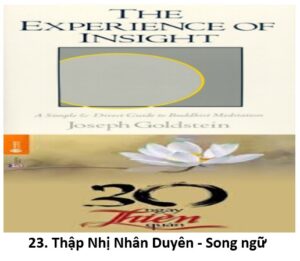
Twenty-first Evening – Thập Nhị Nhân Duyên – Dependent Origination
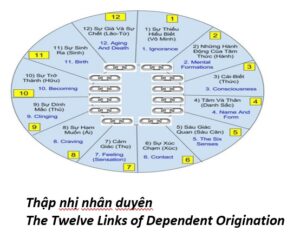
It is because of the mystery of birth, old age and death that Buddhas arise in the world. There is no realm of existence in which these realities do not exist, and it is the sole purpose of the Buddha’s enlightenment to penetrate into their root causes. Perhaps the most profound part of the Buddha’s teaching is the description of how this wheel of life, death and rebirth continues rolling on. The insight into all the links of the chain of existence is expressed in what is called the Law of Dependent Origination.
Cũng vì sự bí mật của sanh, lão, bệnh, tử mà các đức Phật đã xuất hiện trong cuộc đời. Không một cõi thế giới nào mà lại không bị chi phối bởi những sự thật này, và sự giác ngộ của đức Phật chỉ có mỗi một mục đích duy nhất là để hiểu thấu được các nguyên nhân gốc rễ của nó. Có lẽ phần uyên thâm nhất của giáo lý đức Phật là một diễn tả về sự luân chuyển không ngừng của sợi dây xích hiện hữu này được gọi là luật Nhân Duyên.
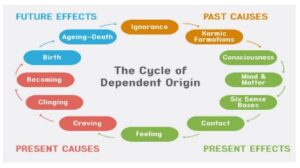
There are twelve links in this Law of Dependent Origination.
The first two have to do with causes in the last life which condition
birth in this one. The first of these links is ignorance. Ignorance means
not knowing the truth, not understanding the Dharma,
ignorance of the four noble truths.
There are twelve links in this Law of Dependent Origination. The first two have to do with causes in the last life which condition birth in this one. The first of these links is ignorance. Ignorance means not knowing the truth, not understanding the Dharma, ignorance of the four noble truths. Because we do not perceive things clearly, because we do not perceive the fact of suffering and its cause and the way out, that force of ignorance conditions the next link in the chain: volitional actions of body, speech, and mind motivated by wholesome or unwholesome mental factors. Volitional activity is conditioned by ignorance; because we don’t understand the truth, we are involved in all kinds of actions. And the karmic force of these actions conditions the third link in the chain.
Có mười hai nhân duyên mà chúng ta thường gọi là Thập Nhị Nhân Duyên, chúng là: Vô minh, Hành, Thức tái sanh, Danh sắc, Lục nhập, Xúc, Thọ, Ái, Thủ, Hữu, Sanh, Lão Bệnh tử. Hai nhân duyên đầu tiên nói về các nhân được gieo trong nhũng kiếp quá khứ và làm điều kiện cho kiếp sau này. Nhân duyên đầu tiên là Vô minh. Vô minh có nghĩa là u tối, không thấy được chân lý, không hiểu giáo pháp, không biết được Tứ Diệu Ðế. Cũng vì ta không ý thức được sự việc một cách rõ ràng, không thấy đuợc sự thật khổ đau, gốc rễ của nó và phương pháp giải thoát, cho nên sự Vô minh đã làm điều kiện cho nhân thứ hai trong chuỗi Thập Nhị Nhân Duyên là Hành. Hành có nghĩa là ý chí, ý muốn bắt đầu cho những hành động của thân, khẩu và ý. Những hành động này phát sinh lên do những tâm thiện hay bất thiện. Hành là do Vô minh tạo nên, vì chúng ta không hiểu được sự thật cho nên ta tạo tác nên đủ loại nghiệp. Và rồi nghiệp lực của những hành động này lại làm điều kiện cho móc nối thứ ba trong chuỗi Nhân Duyên.

The third link is rebirth consciousness; that is, the first moment of consciousness in this life. Because ignorance conditioned the energy of karmic activity in our last life, rebirth consciousness arises at the moment of conception. Volition or intention is like the seed; rebirth consciousness, like the sprouting of that seed. A cause-and-effect conditioned relationship. Because of ignorance there were all kinds of actions, all kinds of karmic formations. Because of karmic formations arises rebirth consciousness, the beginning of this life. Because of the first moment of consciousness in this life, arise the whole mind-body phenomena, all the elements of matter, all the factors of mind. Because of the mind-body phenomena arising, the sense spheres develop. This is during development of the embryo, before birth.
Nhân duyên thứ ba là Thức tái sanh, có nghĩa là tâm thức đầu tiên khi ta mới sanh ra. Vì Vô minh làm điều kiện cho nghiệp lực mà ta đã tạo tác trong kiếp trước, Thức tái sanh sẽ khởi lên trong giây phút thụ thai. Tâm Hành là nhân mà Thức tái sanh là quả. Một sự liên hệ có điều kiện của luật nhân quả. Sự Vô minh sanh ra tâm Hành tạo nên nhiều nghiệp lực. Những nghiệp lực ấy làm phát sanh ra Thức tái sanh, điều kiện bắt đầu cho cuộc sống này. Và cũng vì có tâm thức đầu tiên ấy mà cả hiện tượng Danh sắc được khởi lên với đầy đủ mọi phần tử của thân và mọi yếu tố của tâm. Rồi tự hiện tượng Danh sắc mà Lục nhập phát sinh. Lục nhập tức những quan năng của mắt, tai, mũi, lưỡi, thân và ý, được phát triển trong giai đoạn ta còn bào thai.
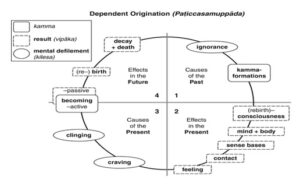
Twelve Links of Dependent Origination: Cause of the past,
Effect in the present, Cause of the present, Effect in the future.
Rebirth consciousness at the moment of conception conditions the arising of mind-body phenomena. Because of that arise all the six spheres of the senses, the five physical senses and the mind, which in turn conditions the arising of contact, contact between the sense organ and its appropriate object: the eye and color, the ear and sound, nose and smell, tongue and taste, body and sensation, mind and thoughts or ideas. Contact involves the coming together of an object through its appropriate sense door and the consciousness of either seeing, hearing, smelling, tasting, touching, or thinking. Conditioned by the senses, contact comes into being. Because of the contact between the eye and color, the ear and sound, and the other senses and their objects, there arises feeling. Feeling means the quality of pleasantness, unpleasantness, or neither pleasantness nor unpleasantness involved in every mind moment, in every moment of contact. Whether it is contact through the five physical sense doors or through the mind, feeling is always present, and is called, therefore, a common mental factor. Conditioned by contact, there arises feeling; that is, the quality of pleasantness, unpleasantness or neutrality.
Thức tái sanh trong giây phút thụ thai làm điều kiện phát sanh nên hiện tượng Danh sắc. Vì sự có mặt của Danh sắc mà Lục nhập, gồm năm giác quan và ý thức sanh ra. Rồi Lục nhập lại làm điều kiện cho Xúc, tức sự tiếp nhận của những giác quan (Căn), khi tiếp xúc với những đối tượng của chúng (Trần), như là mắt với màu sắc, tai với tiếng động, mũi với mùi, lưỡi với vị, thân với cảm giác, ý thức với lại tư tưởng. Xúc đòi hỏi cả ba yếu tố: Căn (giác quan), Trần (đối tượng của giác quan) và Thức (sự nghe, thấy, ngữi, nếm, cảm giác và suy nghĩ). Lục nhập làm phát sinh Xúc. Rồi bởi vì sự tiếp xúc giữa mắt với màu sắc, tai với tiếng động, và những Căn với Trần khác mà Thọ sanh lên. Thọ tức là những cảm giác dễ chịu, khó chịu hay trung hòa xảy ra trong từng sát na của tâm, khi có sự xúc chạm. Dù sự tiếp xúc có qua những cánh cửa giác quan hay là qua ý thức, Thọ lúc nào cũng có mặt, và nó được gọi là một tâm hành cơ bản. Xúc làm điều kiện phát sanh của Thọ, tức là những cảm giác của ta.
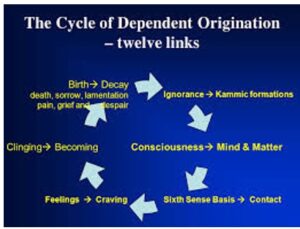
The cycle of dependent Origination – twelve links.
Because of feeling arises craving. Craving means desiring, hankering after objects. What is it that we desire? We desire pleasant sights and sounds, pleasant tastes and smells, pleasant touch sensations and thoughts, or we desire to get rid of unpleasant objects. Desire arises because of feelings. We start hankering after, or wishing to avoid, these six different objects in the world. Feeling conditions desire. Desire conditions grasping. Because we have a desire for the objects of the six senses, mind included, we grasp, we latch on to, we become attached. Grasping is conditioned by desire.
Bởi vì có Thọ nên mới có Ái. Ái tức là lòng tham dục, ham muốn, khao khát một vật gì. Chúng ta muốn gì? Chúng ta muốn những hình ảnh âm thanh dễ chịu, những mùi vị thơm ngon, những cảm giác, tư tưởng tươi mát, nhẹ nhàng. Chúng ta muốn vứt bỏ mọi điều gì làm cho mình khó chịu. Ái sanh ra là bởi có Thọ. Chúng ta bắt đầu khao khát hoặc là trốn tránh những đối tượng khác nhau của Lục nhập. Thọ là điều kiện phát sanh của Ái. Ái là điều kiện phát sanh ra Thủ. Thủ có nghĩa là nắm giữ, muốn lấy làm của mình. Bởi vì chúng ta có tham dục nơi các đối tượng của sáu giác quan, kể cả ý thức, nên ta muốn chiếm giữ, nắm bắt, ta nhận chúng là mình, gắn bó với chúng. Bởi có Ái nên mới có Thủ.
Because of grasping, again we get involved in karmic formations, repeating the kinds of volitions which, in our past life, produced the rebirth consciousness of this life. Feeling conditions desire, desire conditions grasping, and grasping conditions the continual actions of becoming, creating the energy which is the seed for rebirth consciousness in the next life. Because of these karmic actions resulting from grasping, again there is birth.
Rồi bởi vì Thủ mà ta bắt đầu tạo nghiệp, gây quả, tiếp tục những hành động trong kiếp trước mà đã tạo nêm Thức tái sanh cho kiếp này. Thọ sanh Ái, Ái sanh ra Thủ và Thủ làm điều kiện cho Hữu tức là một sự tiếp nối trở thành, nó làm năng lực cho hạt giống luân hồi, Thức tái sanh cho kiếp sau. Từ những nghiệp lực này, được tạo nên do Thủ, mà ta lại có Sanh.
Because there is birth, there is disease, there is sorrow. There is decay, there is pain. There is suffering. There is death. And so, the wheel goes on and on, an impersonal chain of causality.
Vì Sanh nên mới có Bệnh tật, chán nản. Có tàn hoại và đau đớn. Có khổ đau, có Chết. Và bánh xe luân hồi lại tiếp tục xoay tròn, kéo theo một chuỗi Nhân Duyên vô Ngã.
The Buddha’s problem, and the problem of us all, is to discover the way out of this cycle of conditioning. It is said that on the night of his enlightenment he worked backward through the Law of Dependent Origination, seeking the place of release. Why is there old age, disease and death? Because of birth. Why is there birth? Because of all the actions of becoming, all the volitional activities motivated by greed, hatred and delusion. Why are we involved in these kinds of activities? Because of grasping. Why is there grasping? Because of desire in the mind. Why is there desire? Because of feeling, because the quality of pleasantness or unpleasantness arises. Why is there feeling? Because of contact. Why is there contact? Because of the sense-spheres and the whole mind-body phenomena.
Vấn đề của đức Phật và của tất cả chúng ta, là làm sao tìm được một lối thoát ra khỏi cái vòng lẩn quẩn Nhân Duyên tiếp nối này. Tương truyền rằng trong đêm giác ngộ dưới gốc Bồ đề, đức Phật đã đi ngược lại dòng Nhân Duyên tìm một lối thoát. Tại sao có già, có bệnh, có chết? Vì có Sanh. Tại sao lại có Sanh? Vì có Hành phát khởi do tham, sân, si. Nhưng tại sao chúng ta lại bị vướng víu vào những hành động này? Vì có Hữu. Tại sao lại có Hữu? Vì có Ái. Tại sao lại có Ái? Vì có Thọ, vì những cảm giác dễ chịu, khó chịu khởi lên. Tại sao lại có Thọ? Vì có Xúc. Tại sao lại có Xúc? Vì có Lục nhập, và cả một hiện tượng Danh và Sắc.
But there’s nothing we can do now about being a mind-body process. That is conditioned bypast ignorance and having taken birth. So, there is no way to avoid contact. There’s no possible way of closing off all the sense organs even if that were desirable. If there’s contact, there’s no way of preventing feeling from arising. Because of contact, feeling will be there. It’s a common factor of mind. But it is right at this point that the chain can be broken.
Chúng ta không làm gì được khi đối diện với tiến trình thân tâm này. Nó có vì sự Vô minh trong quá khứ và vì chúng ta đã sanh ra ở đây. Không có cách nào để tránh sự tiếp xúc, đụng chạm cả. Chúng ta không thể nào đóng lại những cửa giác quan của mình, cho dù chúng ta có muốn. Mà đã có tiếp xúc, đụng chạm thì ta không thể nào ngăn không cho Thọ khỏi phát sinh lên được. Hễ đã có Xúc thì sẽ có Thọ. Ðó là một tâm hành cơ bản của tâm. Nhưng cũng ngay ở điểm quan trọng này, Thọ, mà ta có thể cắt đứt được chuỗi Nhân Duyên liên tục ấy.
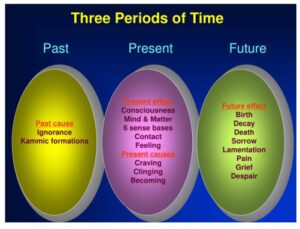
Dependent Origination – Paticca-Samuppada.
“Paticca: dependent upon, Samuppada: arising or dependent.”
Understanding the Law of Dependent Origination, how because of one thing, something else arises, we can begin to break the chain of conditioning. When pleasant things arise, we don’t cling. When unpleasant things arise, we don’t condemn. When neutral things arise, we’re not forgetful. The buddha said that the way of forgetfulness is the way of death. And that the way of wisdom and awareness is the path to the deathless. We are free to break this chain, to free ourselves from conditioned reactions. It takes a powerful mindfulness in every moment not to allow feelings to generate desire.
Hiểu được luật Nhân Duyên, bởi vì cái này có mà cái kia có, chúng ta có thể chặt đứt đi sợi dây xích liên tục ấy. Khi một lạc thọ phát sinh, ta không nên nắm bắt, khi một thọ khổ có mặt, ta không xua đuổi. Khi có một cảm thọ trung hòa, ta không rơi vào quên lãng, thất niệm. Ðức Phật dạy con đường của thất niệm là con đường của sự chết. Và con đường của chánh niệm và trí tuệ là con đường đưa đến sự bất tử. Chúng ta có hoàn toàn tự do để phá tung sợi dây xiềng xích này, thoát ra khỏi những phản ứng do điều kiện. Chúng ta phải duy trì một sự tỉnh thức, một chánh niệm vững chãi trong từng giây phút, để giữ cho cảm Thọ không khởi sanh lên Ái dục.

Bắt đầu ngày mới với nụ cười và suy nghĩ tích cực.
When there’s ignorance in the mind, feeling conditions desire. If there’s something pleasant, we want it; something unpleasant, we desire to get rid of it. But if instead of ignorance in the mind there is wisdom and awareness, then we experience feeling but don’t compulsively or habitually grasp or push away. If the feelings are pleasant, we experience them mindfully without clinging. If unpleasant, we experience them mindfully without condemning. No longer do feelings condition desire; instead, there is mindfulness, detachment, letting go. When there is no desire, there’s no grasping; without grasping, there’s no volitional activity of becoming. If we are not generating that energy, there’s no rebirth, no disease, no old age, no death. We become free. No longer driven on by ignorance and desire, the whole mass of suffering is brought to an end.
Những khi ta thất niệm, cảm thọ sẽ làm cho ái dục phát sanh. Nếu có điều gì dễ chịu, ta sanh ra sự ưa thích; còn những gì khó chịu, ta lại có lòng muốn hủy diệt nó đi. Nhưng nếu thay vì thất niệm, ta có một chánh niệm và trí tuệ, thì mỗi khi có một cảm thọ sinh lên, ta chỉ kinh nghiệm nó mà không phản ứng mù quáng theo thói quen là nắm bắt hay chối bỏ. Ðối với một cảm thọ dễ chịu, ta kinh nghiệm nó bằng chánh niệm mà không bám víu. Ðối với cảm thọ khó chịu, ta kinh nghiệm bằng chánh niệm mà không ghét bỏ. Cảm thọ không còn làm phát khởi Ái dục nữa. Bây giờ chỉ có chánh niệm, vô tư, xả bỏ. Không có Ái dục thì sẽ không có Thủ, không còn Thủ thì Hữu cũng sẽ không sanh. Mà chúng ta không còn tạo nên năng lực thì sẽ không có tái sanh, không bệnh, không già, không chết. Chúng ta hoàn toàn tự do. Không còn bị lôi cuốn bởi Vô minh và Ái dục, tất cả khối khổ đau sẽ bị hoàn toàn tiêu trừ.
Every moment of awareness is a hammer stroke on this chain of conditioning. Striking it with the force of wisdom and awareness, the chain gets weaker and weaker until it breaks. What we are doing here is penetrating into the truth of the Law of Dependent Origination, and freeing our minds from it.
Mỗi giây phút của chánh niệm, tỉnh thức là một nhát búa đập xuống sợi dây xiềng xích Nhân Duyên này. Những nhát búa giáng xuống với sức mạnh của trí tuệ, của ý thức sẽ làm cho sợi dây xích càng lúc càng yếu đi, cho đến khi nó bị đứt tung. Những gì chúng ta đang thực hành ở đây là quán chiếu thẳm thấu vào trong chân lý của luật Nhân Duyên, để giải thoát tâm ta ra khỏi sự ràng buộc của chúng.
*** *** ***
Question: I am finding that as I practice, I am becoming more and more aware of the beauty of the Dharma, the way things are working.
Hỏi: Tôi thấy rằng càng đi sâu vào sự tu tập, tôi lại càng cảm nhận được cái hay, cái đẹp của giáo pháp, tự tính của mọi sự vật.
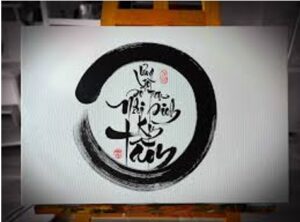
“Ưng Vô Sở Trụ, Nhi Sinh Kỳ Tâm”
You must be nonlocal, for the appearing of this mind.
Answer: The highest kind of happiness is Vipassana happiness, the happiness of insight, seeing how things are working. It is a very happy state when one begins to appreciate with a beginner’s mind every moment as new, as fresh. So, there is a great delight in existence which comes from a beginner’s mind, from a de-conditioned mind, a mind that is experiencing directly rather than thinking about everything. The Buddha has said that the taste of the Dharma excels all other tastes. It gives such a feeling of clarity and understanding and beauty, to see clearly how everything is working, to be in tune, to be in harmony, to be one with the Tao.
Ðáp: Hạnh phúc cao thượng nhất là hạnh phúc của Vipassana, hạnh phúc của trí tuệ, nhìn thấy được tự tướng của vạn hữu. Khi ta bắt đầu cảm nhận bằng một sơ tâm của đứa trẻ thơ, mỗi giây phút đều là mới lạ, tươi mát, thì trạng thái này an lạc lắm. Cũng vậy, sự sống của ta sẽ là một niềm vui lớn nếu ta biết sống với cái sơ tâm ấy, một tâm không bị điều kiện chi phối, một tâm biết trực nghiệm thay vì cứ tưởng tượng. Ðức Phật dạy rằng mùi vị của đạo pháp siêu diệu hơn mọi thứ mùi vị khác. Nó đem lại cho ta một cảm giác sáng suốt, hiểu biết, để nhìn thấy rõ tự thể của vạn hữu, để hòa hợp chung một giai điệu và trở thành một với Ðạo lớn.
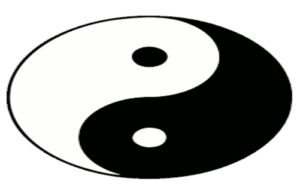
Tao or Dao: the “way”, “path”, “route”, “road” or
Sometimes more loosely “principle”: “simplicity, patience,
compassion. …going with the flow, letting go…, harmony…
On the way to the perfection of harmony is a very deep experience of the un-satisfactoriness, of the suffering inherent in this impermanent process. Many people here have had tastes of that dissatisfaction. Going through this perspective fosters tremendous detachment. When you deeply experience the suffering of mind and body, you see clearly the value of letting go, you’re not grasping any more. You see nothing very desirable about it. Out of that kind of detachment, one’s mind comes into a harmonious balance where you are seeing the whole flow with great equanimity, with a very clear and peaceful mind.
Nhưng trên con đường đi đến sự hòa điệu hoàn toàn ấy, đôi khi ta phải trải qua một kinh nghiệm bất mãn rất sâu đậm. Một khổ đau mà ta đã thừa hưởng từ luật vô thường của cuộc sống. Có nhiều người đã phải nếm qua mùi vị của sự chán nản này. Những ai đã từng trải qua cảnh ngộ ấy, thường được một lợi lộc là có một thái độ ung dung tự tại, Vì khi ta kinh nghiệm được một cách sâu xa những nỗi khổ đau của thân và tâm, ta sẽ hiểu rõ ràng giá trị của một thái độ vô chấp, xả bỏ, ta sẽ không còn muốn nắm giữ nữa. Ta biết chúng chẳng có gì đáng để cho mình ham muốn. Và từ sự vô chấp ấy, tâm của ta sẽ trở nên quân bình và có thể nhìn sự thay đổi của mọi vật bằng một thái độ ung dung, với một ý thức sáng tỏ và an lạc.
Question: To achieve enlightenment, do you have to die?
Hỏi: Muốn đạt được giác ngộ, ta có cần phải chết đi không?
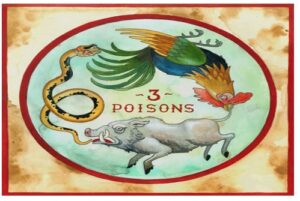
Enlightenment is the death of greed, hatred and delusion.
Answer: Enlightenment is the death of greed, hatred and delusion. The reason that we have fear of dying is because we don’t understand how the process is happening right now, and so to an untrained mind there’s fear involved in giving this up. Actually, there is no one to die because there is no one behind the process. What is happening is moment to moment birth and death, birth and death … kept going by the force of desire and grasping. To decondition, to free the mind from grasping and desire, is to experience the state of peace which is there all the time but which we are prevented from realizing by the force of attachment. It’s like that monkey who’s holding on and nothing is binding him except the force of desire in his own mind. All he has to do is open his hand and slip out. All we have to do it let go.
Ðáp: Giác ngộ có nghĩa là sự chết của tham, sân và si. Lý do chúng ta sợ chết
là vì ta không hiểu rằng tiến trình của sự chết đang xảy ra trong giờ phút này. Cho nên đối với những người không tu tập, họ có nỗi sợ phải mất đi thân này. Thật ra thì không có một ai chết cả, vì đâu có một cá nhân nào đứng phía sau tiến trình ấy. Sự thật chỉ là một chuỗi sanh diệt, sanh diệt liên tục tiếp nối nhau… theo sự lôi cuốn của Ái và Thủ. Muốn giải trừ những điều kiện ấy, giải thoát tâm ta ra khỏi sự đam mê và bám víu ta phải biết kinh nghiệm được sự an vui lúc nào cũng đang hiện có mặt, nhưng vì ái dục mà ta không thấy được. Cũng giống như mốt con khỉ đang nắm chặt bàn tay, nó chẳng bị một ai trói buộc ngoài trừ lòng tham dục của chính nó. Nó chỉ cần mở rộng bàn tay ra là thoát được. Chúng ta cũng vậy, chỉ cần buông xả là có thể tự tại bước đi.

All we have to do is letting it go. Don’t get caught…
Sources:
Tài liệu tham khảo:
- https://theravada.vn/ba-muoi-ngay-thien-quan-loi-mo-dau/
- https://tienvnguyen.net/images/file/lHJ4Mqq01wgQAPRx/30-ngaythienquan.pdf
- https://www.tienvnguyen.net/images/file/8hKjNaq01wgQAKJW/the-experience-of-insight.pdf
- Photo 2: http://evdhamma.org/index.php/dharma/dharma-lessons/item/175-14-thap-nhi-nhan-duyen-song-ngu
- Photo 3: https://www.facebook.com/Vipassanaorganisation/posts/the-law-of-dependent-originationthe-buddha-explained-the-working-of-the-four-nob/1951196298234507/
- Photo 4: http://evdhamma.org/index.php/dharma/dharma-lessons/item/321-76-chuyen-mot-phu-nu-vo-minh-song-ngu
- Photo 5: https://link.springer.com/referenceworkentry/10.1007%2F978-1-4020-8265-8_1556
- Photo 6: https://slideplayer.com/slide/9323210/
- Photo 7:https://www.slideserve.com/natala/paticca-samuppada
- Photo 8: https://www.pinterest.com/pin/625930048189368381/
- Photo 9: https://www.facebook.com/TranhThuPhapTVT/posts/1978928055575728/
- Photo 10: https://en.wikipedia.org/wiki/Tao
- Photo 11: https://gumroad.com/l/MWnJ
- Photo 12: https://www.youtube.com/watch?v=5p5g0JqLp9E
